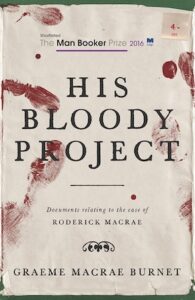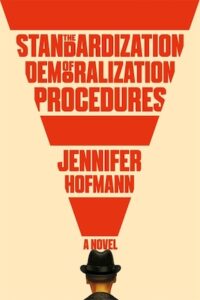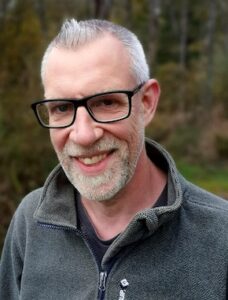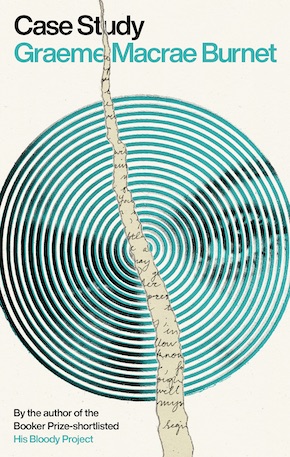Madness, lies
by Graeme Macrae BurnetGraeme Macrae Burnet’s fourth novel Case Study is an inventive, archly funny meditation on mental health and the nature of self, in which a young woman presents herself under an assumed identity as a patient to a charismatic, self-taught psychotherapist called Collins Braithwaite, who she believes may have encouraged her sister’s suicide. Set chiefly in northwest London in 1965, it intersperses the unstable, unworldly woman’s notebooks with Macrae’s ostensible biographical sketches of Braithwaite, and unravels a complex mystery that chips away at the authority and sanity of each of the characters – and perhaps of the human race at large…
Where are you now?
I’m sitting at my desk in my flat in the West End of Glasgow.
Where and when do you do most of your writing?
Generally I do most of my writing in the nearby Mitchell Library, but the pandemic put paid to that. So these days, here at my desk.
How would you summarise your lockdown experience?
I think writers are very fortunate in that we have been able to continue to work and people are still reading books – if not even more than before. I had a few trips abroad cancelled of course, but I feel very lucky that I didn’t have a book out during lockdown.
If you have one, what is your pre-writing ritual?
I generally spend a few hours procrastinating, long enough to work myself up into a fug of self-loathing, and then as the day ebbs away force myself to begin.
Full-time or part-time?
I would say I’m full-time engaged in the business of being a writer, whether that’s actually writing or taking care of being-a-writer-related business.
Pen or keyboard?
A bit of both. I hate being inside when it’s sunny (and, yes, it is sometimes sunny in Glasgow), so I like to write outside which means pen and paper. I also keep my research notes by hand.
 How do you relax when you’re writing?
How do you relax when you’re writing?
Haha. I can’t think of anything less relaxing than writing. I wouldn’t even try to relax when doing it. They are opposites.
How would you pitch your latest book in up to 25 words?
Sixties London. Radical psychotherapy. Mysterious notebooks. A bench that appears to be a cockroach. Too many G&Ts. Blancmange. Fangdale Beck.
Who do you write for?
Myself. I don’t think about readers when I’m writing.
Who do you share your work in progress with?
Only one person. My friend Victoria who used to be a script editor and drama producer. But I’ll generally be well into a first draft before I will show even her, which means that I might be working on something for well over a year before anyone sees anything. I’m not a natural collaborator.
Which literary character do you wish you created?
I wouldn’t say that I wish I had created him (see question 13), but I think Raskolnikov is the greatest character in fiction.
Share with us your favourite line/s of dialogue, poetry or prose.
Clearly an impossible task. But here’s an opening sentence I love:
“At the time one takes them for quite ordinary hours, and it only later on, in retrospect, one knows they were momentous.”
(Newhaven-Dieppe, Georges Simenon)
And these lines from John Donne’s ‘A Nocturnall Upon St. Lucies Day’ are pretty cool:
The world’s whole sap is sunk;
The general balm th’ hydroptic earth hath drunk,
Whither, as to the bed’s feet, life is shrunk,
Dead and interr’d; yet all these seem to laugh,
Compar’d with me, who am their epitaph.
Which book do you wish you’d written?
It’s not that I don’t admire other books (of course I do), but I never wish I’d written someone else’s. A good book is stamped absolutely with the DNA of its author. No one else could write it.
Which book/s have you most recently read and enjoyed?
The books I’ve most enjoyed and admired recently are Annie Ernaux’s A Girl’s Story and Simple Passion. She is head and shoulders above everyone. I can’t believe she hasn’t won the Nobel Prize.
What’s on your bedside table or e-reader?
I’m currently flipping between Such a Fun Age by Kiley Reid and The Young Team by Graeme Armstrong.
Which books do you feel you ought to have read but haven’t yet?
Oh, nobody should feel they ‘ought’ to read anything (except maybe my new book, haha).
Which book/s do you treasure the most?
I have a pretty extensive collection of Simenon books (120+) which I would probably try to save from a fire. Also my copy of Country Girls signed by Edna O’Brien in purple ink, and my copy of The Years signed by Annie Ernaux “avec amitié“.
 What is the last work you read in translation?
What is the last work you read in translation?
At least half of the novels I read are in translation (I love translators!). The most recent were The Woman from Uruguay by Pedro Mairal and The Masterpiece by Zola.
Which story collections would you particularly recommend?
I don’t really read short stories.
What will you read next?
I have a proof of my friend Catherine Simpson’s new book, One Body. I loved her memoir When I Had a Little Sister, so I’m looking forward to that. Also a book I picked up purely on the basis of its magnificent title: The Standardization of Demoralization Procedures by Jennifer Hoffman.
What are you working on next?
As soon as the promotional activities for Case Study have died down I’m going to get properly stuck into writing the final part of my France-based Gorski trilogy.
Imagine you’re the host of a literary supper, who would your dinner guests be (living or dead, real or fictional)?
Madeleine Bourdouxhe, Annie Ernaux, Rupert Thomson, Isabelle Huppert, R.D. Laing, Marjane Satrapi and Keith Richards. I would cook, but there would be lots of booze. I think Keith and Annie would get on great.
If you weren’t writing you’d be…?
For preference, in a nice pub with a couple of pals.
If you were the last person on Earth, what would you write?
Probably a massive HELP sign visible from outer space – I hate being alone.
How can we make peace with our planet?
Everyone over 25 should be disbarred from power. Let the kids have a go.
 Graeme Macrae Burnet was born and brought up in Kilmarnock, and spent some years working as an English teacher in Prague, Bordeaux, Porto and London before moving to Glasgow and working for various television companies. He has degrees in English Literature and International Security Studies from Glasgow and St Andrews universities. His novel His Bloody Project (Saraband, 2015), about a brutal triple murder in a remote Scottish Highland community during the 1860s, won the Saltire Society Fiction Book of the Year Award and the Vrij Nederland Thriller of the Year Award, and was shortlisted for the Man Booker Prize and the LA Times Book Prizes. He is also the author of two novels featuring the diffident French inspector Georges Gorski: The Disappearance of Adèle Bedeau (Contraband, 2014) and The Accident on the A35 (Contraband, 2017). Case Study is published by Saraband in hardback and eBook.
Graeme Macrae Burnet was born and brought up in Kilmarnock, and spent some years working as an English teacher in Prague, Bordeaux, Porto and London before moving to Glasgow and working for various television companies. He has degrees in English Literature and International Security Studies from Glasgow and St Andrews universities. His novel His Bloody Project (Saraband, 2015), about a brutal triple murder in a remote Scottish Highland community during the 1860s, won the Saltire Society Fiction Book of the Year Award and the Vrij Nederland Thriller of the Year Award, and was shortlisted for the Man Booker Prize and the LA Times Book Prizes. He is also the author of two novels featuring the diffident French inspector Georges Gorski: The Disappearance of Adèle Bedeau (Contraband, 2014) and The Accident on the A35 (Contraband, 2017). Case Study is published by Saraband in hardback and eBook.
Read more
graememacraeburnet.com
@GMacraeBurnet
@SarabandBooks


